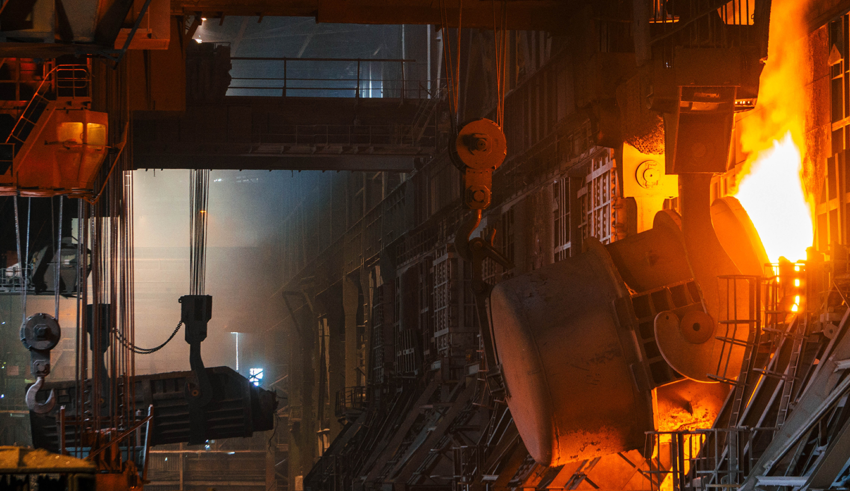PRESS RELEASES | 19/12/2022
Product standards crucial to deliver a strong net zero industrial base

Today, the Aldersgate Group launches a new report with Frontier Economics outlining how the introduction of mandatory product standards can strengthen the UK’s industrial sectors and accelerate their decarbonisation, which presents a major opportunity to create jobs and prosperity across the UK economy.
Based on extensive engagement with over 20 major businesses from across the economy, this report calls on the Government to implement mandatory product standards that place a limit on the lifecycle emissions of products sold in the UK market. This can encourage consumers to purchase low carbon products while disincentivising the sale of high carbon alternatives. Crucially, these standards would help to support the competitiveness of UK industry, by preventing cheap, high carbon imports from undermining goods produced in the UK.
In addition to supporting the UK’s net-zero goals, industrial decarbonisation can drive growth and longer-term economic opportunities by improving productivity, increasing resource and energy efficiency, and increasing domestic supplies of low carbon materials as sectors across the economy look to harness growing green markets.
Meeting the UK’s decarbonisation goals will require changes to how products in the UK are manufactured. To justify the large-scale investment that is required to achieve this, businesses need to be confident that there is a strong market for low carbon products. To drive this much-needed investment, this report calls for the implementation of well-designed, mandatory low carbon product standards to spur private investment and innovation by strengthening confidence in future demand, in line with industry feedback received throughout its development. This is critical to delivering net zero industry and manufacturing in the UK and seizing the economic opportunities associated with it.
By requiring both intermediate industrial products, such as steel and glass, and end-consumer goods, like cars and buildings, sold on the UK market to meet a minimum standard on lifecycle emissions, durability, and recycled content, the Government can also ensure that industry is competing on a level playing field. This will also mean that companies pushing further on reducing emissions are not put at a competitive disadvantage.
Many businesses note that, voluntary steps are already being taken to reduce the emissions due to pressure from customers, however uptake of these measures remains limited due to fear of unfair competition from higher carbon imports. Stakeholders report that voluntary standards are unlikely to produce significant change, and that standards need to be set at a mandatory level to drive innovation in intermediate and finished goods across industrial supply chains and have an effective impact on emissions.
While product standards can help to improve the business case for investment in net zero, they are not a silver bullet. Accelerating industrial decarbonisation and unlocking the economic benefits that could come with it, will require a range of polices, such as business models that support the roll-out of low carbon hydrogen and CCS, and measures to increase the supply and reduce the cost of low carbon electricity to enable the electrification of industry (as well as transport and heating).[2]
Matthew Bell, Director at Frontier Economics said: “Product standards can help to support an efficient low carbon transition. Our work with leading companies across the UK suggests broad support for properly implemented mandatory standards to ensure a level playing field and clear signal about the pace and destination for their products. They would help to plan new investment and inform consumers.”
Key policy recommendations for the implementation of effective product standards include:
- Implement mandatory product standards to grow demand for low carbon industrial goods and materials, outlining clear timelines for their introduction.
- Develop product standards that apply throughout the supply chain to both intermediate and finished products. This will ensure that standards create demand for both specific low carbon materials and products across multiple parts of the supply chain at once. But these standards must be developed in a complementary way that avoids creating multiple standards for the same material.
- Assign responsibility for developing and implementing mandatory product standards to an existing or new institution. Due to the complexity of creating a product standard, this institution should work with industry and coordinate with existing international efforts to define low carbon products to develop efficient standards that drive decarbonisation in the most impactful areas.
- Increase the ambition of mandatory standards over time to ensure that standards continue to encourage innovation and decarbonisation. This will prevent manufacturers from being anchored to an initial standard while supporting further reductions in the carbon-intensity of production by promoting uptake of new technologies as they become available.
- Enact policies that require data transparency and reporting as soon as possible. A lack of data on the embodied and life-cycle emissions of different materials and products, and a lack of transparency on how data is collected and verified, are key barriers to the development of reliable product standards. The institution assigned responsibility for developing and implementing mandatory product standards should also be responsible for ensuring that data and reporting requirements are put in place, and where possible, minimise the complexity and cost of collecting this data to avoid creating barriers for SMEs and manufacturers in lower-income countries.
- Work with policymakers abroad to ensure standards and methodologies in the UK are interoperable with those developed internationally. Export manufacturers will face additional costs if data and production methods required to comply with standards differ internationally. As other countries adopt similar measures, interoperability of different standards will allow for more efficient global cooperation on industrial decarbonisation.
Nick Molho, Executive Director of the Aldersgate Group said: “The transition to net zero emissions provides the UK with a genuine opportunity to offset the decline in industrial activity in recent decades and develop new UK-based supply chains in areas such as low carbon steel, cement, glass and chemicals manufacturing. Product standards have a vital role to play in providing manufacturers with a reliable signal that there will be a growing market for these products, which in turn will help unlock the private sector investment needed in low carbon industry. This must be one of the key policy areas that the Government should work on as part of its overall framework for decarbonising heavy industry.”
Laith Whitwham, Senior Policy Officer at the Aldersgate Group said: “The UK’s industrial and manufacturing sectors have a golden opportunity to use net zero to create economic benefits while delivering for workers and the environment. The competitive edge of the UK’s industries lies in making the switch to low carbon production, but without a variety of supportive policies, the UK risks being left behind by other countries racing to supply the world’s growing green markets. This report sets out how product standards can work with other mechanisms to create a strong business case for investing in the technologies and fuels that will deliver net zero and all the opportunities that come with it.”
Dr. Sara Ridley, Engineering and Quality Director at Autocraft said: “The cyclical reuse and repurposing of industrial materials are integral components of successfully decarbonising the UK. Clear, realistic, mandatory standards are essential to this strategy. Achieving net zero will only be achievable if we see recycling as a last resort, infinite reuse should be the goal.”
Dr. Sanna Markkanen, Research Programme Lead and Senior Analyst, Cambridge Institute for Sustainability Leadership said: “This new report from the Aldersgate Group highlights the importance of demand-side instruments in driving the decarbonisation of the UK’s energy intensive industries. It provides a compelling case for the application of product standards, with clear design principles that would help to improve the long-term competitiveness of the UK’s industry and manufacturing sectors, while also delivering more sustainable and durable products for end consumers.”
Ollie Morris, Sustainability Asset Advisory Lead, ESG Consultancy at CBRE UK said: “CBRE welcomes this new report from the Aldersgate Group, which clearly outlines how the UK can accelerate the transition to net zero while creating new economic opportunities for UK businesses. Well-designed product standards can help to stimulate the growth of markets for low carbon industrial products, unlocking investment in net zero across supply chains, from steel plants all the way through to the built environment sector.”
Mike Pierce, Executive Director of Systems Change at Climate Group said: “Globally agreed standards for net zero steel and concrete are critical in accelerating collective action to decarbonise these sectors. They will play a vital role in stopping confusion on what is considered a net zero material, allowing buyers and users of steel and concrete to work with their supply chains on a common agenda. There’s really no time to wait.”
Andy Walker, Technology Market Insights Director at Johnson Matthey said: “The net zero transition provides a valuable opportunity for the UK’s industry and manufacturing sectors. As businesses undertake ambitious programmes to reduce their emissions, they will need to see clear demand signals for low carbon products in order to enable investment in decarbonisation. This new report from the Aldersgate Group outlines how the Government can design effective mandatory product standards to grow the market for low carbon products and reduce emissions.”
Chris McDonald, Chief Executive Officer of the Materials Processing Institute said: “The future of the UK’s heavy industries relies in-part on making the transition to low carbon production. Green steel for example, will be needed for the world’s energy, transport and heating solutions of the future. But to support the business case for investment in net zero, industry needs to see a strong demand signal for low carbon products. This report from the Aldersgate Group shows how product standards are one of the most powerful tools the Government can use to create demand, and drive down emissions across the economy.”
Diana Casey, Director, MPA Cement and Director of Energy and Climate Change at the Mineral Products Association said: “The Mineral Products Association welcomes this report. Product standards have a key role to play in increasing the demand for low carbon products, but their complexity and the need to link them to the ability of sectors to decarbonise, means it is vital that policy makers work closely with industry in their design. Any introduction of product standards must be accompanied by accurate carbon measurement and disclosure that covers whole life climate impact based on internationally recognised standards, to ensure product standards work to mitigate carbon leakage. MPA stands ready to work with policy makers to develop such standards for mineral products like concrete.”
Olivia Whitlam, Head of Sustainability at Siemens said: “Siemens welcomes this new report from the Aldersgate Group, which sets out the important role of mandatory low carbon product standards in creating a market for cleaner, lower emissions goods. These are crucial to creating the confidence that businesses need to invest in net zero solutions and can provide a level playing field for companies that are already leading the charge in the production of low carbon goods and services, fit for a net zero economy.”
Peter Hodgson, Manager of Sustainability Policy & Assessment at Tata Steel UK said: “There is a pressing need for rationalisation and greater harmonisation across the multitude of current and developing standards that define low carbon-emission products. It is vital that, to avoid unintended consequences, such standards are based on the whole life cycle performance of products; this report makes a valuable contribution to progress in both these regards.”
Julia Barrett, Chief Sustainability Officer at Willmott Dixon said: “Willmott Dixon warmly welcomes the Aldersgate Group’s latest report on the role of product standards in creating demand for low carbon industrial products. The built environment consumes almost half of the materials extracted globally every year, and as this report highlights, by growing the market for low carbon goods and materials, we can reduce energy consumption, cut waste, and increase reuse, while encouraging new economic opportunities and supporting domestic industries.”


